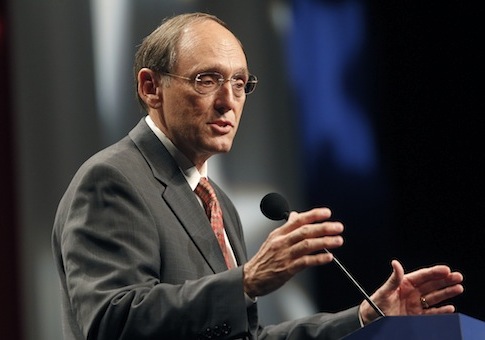President Barack Obama nominated two Republicans and one Democrat to the National Labor Relations Board Wednesday on the eve of a House vote that would defund the board over unconstitutional recess appointments.
Obama re-nominated NLRB Chairman Mark Gaston Pearce, a Democrat, as well as Republican labor attorneys Harry I. Johnson and Philip A. Miscimarra. If confirmed by the U.S. Senate, Johnson and Miscimarra could help the administration avoid House legislation that would prevent the board from functioning.
"With these nominations there will be five nominees to the NLRB, both Republicans and Democrats, awaiting Senate confirmation," Obama said in a statement. "I urge the Senate to confirm them swiftly so that this bipartisan board can continue its important work on behalf of the American people."
A source familiar with the nominations told the Washington Free Beacon that the administration has previously "solicited names from Senate Republicans" of nominees that could be confirmed quickly.
The announcement comes in the wake of the D.C. Circuit Court of Appeals ruling that declared Obama’s recess appointment of Sharon Block and Richard Griffin unconstitutional because the Senate was still in session. Obama outraged congressional Republicans after ignoring the court and allowing the board to continue operating.
Obama nominated Block and Griffin to full terms in February. Sources told the Washington Free Beacon Obama is using the two Republicans to help push through Block and Griffin.
Republicans drafted a package of legislation that would block the NLRB from issuing rulings on labor disputes until the Senate has confirmed at least three board members—the minimum needed to operate, according to a 2010 Supreme Court ruling. The legislative package will be introduced on Wednesday and could come up for a vote on Thursday.
Rep. Phil Roe (R., Tenn.), who sponsored a bill that would force a newly formed NLRB to review the 600 cases it decided after the recess appointments, said the announcement signaled a Republican victory.
"I think [the legislation] made the president go ahead and nominate people to the board who can be confirmed," Roe said. "The president avoided the constitutional process a year ago and now he’s doing his job now, going back to seek the consent of the Senate."
Mark Mix, president of the National Right to Work Foundation, said he hopes the House will still vote on the legislative package "in order to shed light on the fact that this board has been operating outside of legal authority" and to rally Senate Republicans to check Obama’s power.
"President Obama wasn’t going to sign the bill, he’s behind the usurpation of power," Mix said. "But [House Republicans] may use this as leverage to get the GOP in the Senate to conduct thorough vetting [of nominees]."
However, the confirmation of all five nominees does not end the potential impact of the appeals court ruling. Parties that appeared before the understaffed board have filed a lawsuit to dismiss the rulings it handed down. Many have questioned the constitutionality of the decisions.
Many industry and legal observers expect the case to reach the Supreme Court.
"The court of appeals was very clear on the illegality of the recess appointments," Mix said. "These are significant questions in legal field whether or not the legal activities are going to stand."
Republicans have accused the board of becoming an activist branch on behalf of labor unions. Former Republican board member Brian Hayes accused his colleagues of bias in one of the last board rulings in 2012.
However, labor unions have also challenged the constitutionality of the board.
The NLRB and two appeals courts ordered Teamsters Local 523 to pay a non-union worker $47,000 in back-pay after ruling that the union had improperly punished him for not joining. The Tulsa, Okla., union is now challenging the constitutionality of the board, according to the Daily Caller.
"The union disputes that the board is properly and sufficiently constituted, as ‘recess’ appointments (to NLRB) were made when there was no recess," Local 523 president Gary Ketchum said in a court filing.
Ketchum declined comment on the NLRB legislation, saying, "I’m not going to elaborate on that. There may be cases out there that are favorable [to the union]."
The Supreme Court in 2010 threw out hundreds of NLRB decisions dating back to the Bush administration because it operated with less than three board members.
Rep. Roe said Congress can avoid the "uncertainty [the court] has over labor groups and employers" by passing his legislation, which would sunset before 2014.
"The bill says that if the president’s nominees are confirmed, they need to go back and review these decisions, so we don’t have a court throw them all out," he said. "It’s not a partisan issue, it’s a constitutional issue. Democrats should be just as concerned because someday a Republican will be in the White House."
